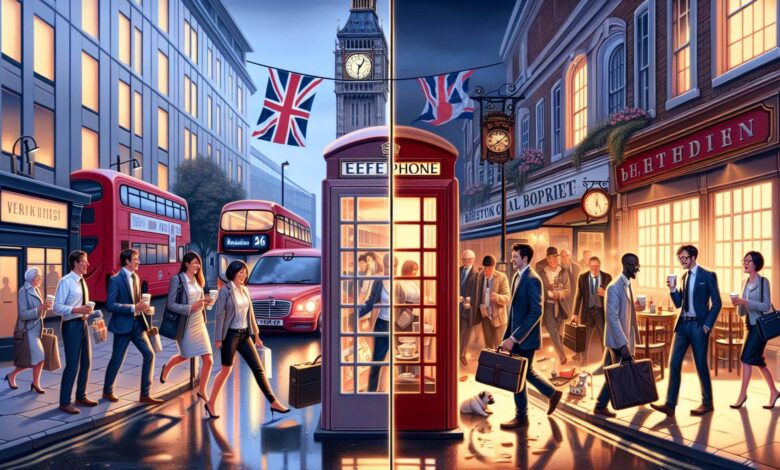Does the UK use military time?

Planning trips, setting meetings, or adjusting your watch in the UK requires knowing the local time format. The term ‘British military time’ may suggest a strict format used by the armed forces. But, 24-hour clock usage in the UK is widespread, affecting daily life more than you might think.
We’re going to explore the world of UK timekeeping. How does a country known for its history adapt to modern timekeeping needs? Whether you’re visiting or live there, understanding British time is fascinating. So, let’s find out if the 24-hour clock is as common in the UK as Big Ben is in London.
Contents
Understanding Time Formats in the UK
Ever been curious about how the UK tells time? It’s common to wonder. The 12-hour and 24-hour clocks each have their roles. Let’s look at why both exist and their current use.
The 12-Hour Clock Explained
The 12-hour clock is for everyday use. It splits the day into two 12-hour parts, marked by AM and PM. It’s liked for casual chats and plans. A few important points:
- AM (Ante Meridiem) marks the time from midnight to noon.
- PM (Post Meridiem) covers noon to just before midnight.
- Usually, context helps us know if it’s morning or night.
It’s a go-to for social plans and TV show times in the UK.
The 24-Hour Clock: What is Military Time?
For formal settings like transport or the military, the 24-hour clock is used. No need for AM and PM here, as hours go from 00 to 23. Understanding it is simple:
- 00:00 is midnight.
- 12:00 is noon.
- Hours then go from 13:00 (1 PM) to 23:00 (11 PM).
This way, there’s less mix-up in precise situations like travel plans and operations.
To sum up, your day might mix both the 12-hour and 24-hour clocks. These systems help the UK balance clarity with tradition.
Exploring the Usage of Military Time in the UK
Ever wondered about the 24-hour clock’s role in the UK? How it’s weaved into everyday life varies widely. Factors like industry, services, and local preferences shape this. Grasping these aspects can unveil more about UK timekeeping and the civilian embrace of the 24-hour clock.
Some areas particularly favor military time for its clarity. Let’s look at where it’s most common:
- Transportation: UK’s trains, buses, and flights use the 24-hour format. It clears up confusion in busy travel spots.
- Healthcare: For crystal-clear records, appointments, and shifts, medical facilities stick to military time.
- Broadcasting: TV and radio follow the 24-hour clock too, matching worldwide broadcasting norms.
Military time is popular in some circles for its exactness. It’s great for planning and professional contexts where time must be clear. Yet, in casual settings, many stick to the 12-hour clock.
In bustling cities like London or Manchester, you’ll see more of the 24-hour clock due to precise time needs. However, rural regions may not adopt military time as much.
Does the UK use military time?
Let’s look at how the UK uses military time. It’s common in the government and public services because it’s so clear and precise. It’s especially important for things like keeping armed forces on schedule and making sure buses and trains are on time. We’ll explore why this 24-hour system is favored in official settings and everyday life.
Official Use in Government and Armed Forces
In the UK, military time is essential for government operations. It helps keep everything organized and everyone on the same page. This is especially important for the military, where timing can be critical. Government departments also use it to communicate clearly and avoid mistakes.
Public Transportation and Broadcasting Standards
Military time makes daily life smoother for people in the UK, especially when using public transportation. Buses and trains use a 24-hour clock. This helps everyone avoid confusion and makes travel easier. Television and radio programs also use military time. This makes it easy for everyone to know when their favorite shows will be on.
- Military time in UK government enhances precision in operations and communication.
- Armed forces timekeeping is instrumental in maintaining the stringent schedules necessary for military efficacy.
- UK public transport times utilize the 24-hour format to streamline travel schedules.
- Broadcast time formats adopt military time to ensure viewers are well-informed about program timings.
Comparing UK Time Practices with Other Countries
The UK’s way of keeping time, especially with military time, gives us interesting insights. When we look at how the UK and other countries keep time, we learn about global norms and unique time management practices.
Time formats differ worldwide based on each country’s needs. A lot of places use the 24-hour clock for both everyday and military needs.Knowing these differences makes it easier to adjust our timekeeping habits. It also lets us see how the world uses military time differently.
- United States: Primarily uses the 12-hour clock in everyday life. The 24-hour format is for military and emergency services.
- Germany: Widespread use of the 24-hour clock makes it easy for everyone to follow a single, clear time system.
- China: Almost always uses the 24-hour system. This makes things like travel and TV programming easier to manage.
- Brazil: The 24-hour format is official, but people often use the 12-hour clock informally.
The UK sticks to the 24-hour clock in the military and for detailed plans. But, its people accept and use this system differently than other countries.
Looking at how different countries keep time helps us understand global timekeeping views. It gives us insight into international time formats and their effects on life and work worldwide.
Military Time in Daily Life: Perceptions and Preferences
In the UK, the 24-hour clock, or military time, is a big part of life. You can see its effects in business and education as you go about your day. It’s interesting to notice how it’s present in many aspects of British life.
How Businesses Operate: Scheduling and Operational Hours
In the business world, the UK leans towards the 24-hour system. This choice makes planning clearer in many fields. It helps avoid confusion, making it easier to arrange work in healthcare, emergency services, and the hospitality industry. Here are some benefits:
- Streamlined communication across different shifts and among team members.
- Prevention of scheduling errors due to time misinterpretation.
- 24-hour clock facilitates dealings with international partners operating in different time zones.
The UK Education System and Time Teaching Methods
Schools are where kids first learn about telling time. The UK’s approach equips them for both school and daily life. It teaches both 12-hour and 24-hour systems early on. This is what happens:
- Primary education introduces children to the concept of time, using playful interactive methods that cater to their developmental stage.
- Secondary education emphasizes practical applications, showing students how different sectors like transportation or the military use the 24-hour format.
- Interactive activities are often employed to help students convert between the two systems effortlessly, making them adaptable in both personal and professional environments.
Knowing how UK schedules work can change your experience. Seeing the use in business and schools shows the country’s cultural adaptability. It’s fascinating to see how deeply ingrained this time format is.
Conclusion
We’ve learned a lot about how the UK keeps time. Now, you should really understand British timekeeping. The 24-hour clock is used in many places, not just by the military. It’s part of daily life in the UK. This includes public services, broadcasting, and schools.
Different factors make people choose between 12-hour and 24-hour time. It could be for clear communication in public transport or need for precision at work. These reasons show that timekeeping in the UK is complex. By exploring UK time practices, we see that military time is widely used. It shapes how people plan their days.
We hope you now have a good picture of how the UK uses military time. And how it affects daily life. Knowing about this can help you understand British culture better. Whether you’re visiting or living there, this knowledge is useful. It helps you fit in and appreciate the UK’s traditions and modern ways.



